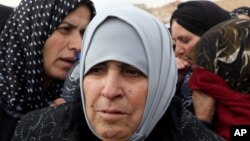GENEVA —
The U.N. refugee agency reports more than 2,500 Syrians fled by barge into Iraq’s Kurdistan region on Sunday. According to UNHCR, this is the first large-scale crossing of refugees since Iraq closed its border with Syria in mid-September.
Border crossings between Iraqi Kurdistan and Syria closed more than three months ago following an exodus of some 60,000 Syrian refugees. A pontoon bridge, which had been the main mode of escape, is not now in use.
As a consequence, the U.N. refugee agency reports this recent group of Syrians piled into small barges to flee into Iraq. The agency says each barge carried between 10 and 30 people and that the journey from Simelka, on the Syrian side of the river, took about 20 minutes.
UNHCR spokeswoman Melissa Fleming said the Syrians were allowed to cross into Kurdistan due to a new, more flexible approach adopted by the Iraqi authorities.
“They are allowing Syrians a seven-day time period to come across and spend time in the country and shop," Fleming explained. "It seems that a lot of them are buying things, buying supplies -- much needed supplies and going back. Those who want to stay beyond the seven days need to legalize their stay, request status as refugees and then they will be taken to one of UNHCR’s camps.”
Fleming said most of the people seem keen to return to Syria. She said UNHCR staff saw about 350 of the new arrivals load barges on Monday - a day after they arrived - and go back to Syria with generators, kerosene heaters and other supplies.
She added that about 400 other people who requested asylum were taken to one of UNHCR’s refugee camps. The agency operates 13 camps or transit sites for Syrian refugees in Iraq's Kurdistan region and one in western Anbar Province. Iraq hosts 210,000 registered Syrian refugees.
In addition to the refugee crisis, Fleming says the UNHCR is concerned about the growing number of people fleeing violence in the Iraqi cities of Fallujah and Ramadi. Iraqi government forces want to retake the cities from al-Qaida - linked Islamist militants.
Fleming said the UNHCR is ready to assess the needs of the displaced people and help them.
“People who are uprooted in an instant very often flee with just the clothes on their backs even if it is in their own countries," she noted. "We have heard that they are sheltering with other families, but also in public buildings and very much could be in need of supplies.”
Iraq already has more than one million internally displaced people who fled their homes during sectarian violence between 2006 and 2008. Most are living in Baghdad, Diyala and Ninewa.
Meanwhile, international agencies including the UNHCR and U.N. Children’s Fund are proposing a $1 billion investment strategy to prevent, what they call, a lost generation of Syrian children, affected by the turmoil of the Syrian civil war.
This appeal comes one week ahead of a major donor conference in Kuwait for humanitarian aid to Syria.
Border crossings between Iraqi Kurdistan and Syria closed more than three months ago following an exodus of some 60,000 Syrian refugees. A pontoon bridge, which had been the main mode of escape, is not now in use.
As a consequence, the U.N. refugee agency reports this recent group of Syrians piled into small barges to flee into Iraq. The agency says each barge carried between 10 and 30 people and that the journey from Simelka, on the Syrian side of the river, took about 20 minutes.
UNHCR spokeswoman Melissa Fleming said the Syrians were allowed to cross into Kurdistan due to a new, more flexible approach adopted by the Iraqi authorities.
“They are allowing Syrians a seven-day time period to come across and spend time in the country and shop," Fleming explained. "It seems that a lot of them are buying things, buying supplies -- much needed supplies and going back. Those who want to stay beyond the seven days need to legalize their stay, request status as refugees and then they will be taken to one of UNHCR’s camps.”
Fleming said most of the people seem keen to return to Syria. She said UNHCR staff saw about 350 of the new arrivals load barges on Monday - a day after they arrived - and go back to Syria with generators, kerosene heaters and other supplies.
She added that about 400 other people who requested asylum were taken to one of UNHCR’s refugee camps. The agency operates 13 camps or transit sites for Syrian refugees in Iraq's Kurdistan region and one in western Anbar Province. Iraq hosts 210,000 registered Syrian refugees.
In addition to the refugee crisis, Fleming says the UNHCR is concerned about the growing number of people fleeing violence in the Iraqi cities of Fallujah and Ramadi. Iraqi government forces want to retake the cities from al-Qaida - linked Islamist militants.
Fleming said the UNHCR is ready to assess the needs of the displaced people and help them.
“People who are uprooted in an instant very often flee with just the clothes on their backs even if it is in their own countries," she noted. "We have heard that they are sheltering with other families, but also in public buildings and very much could be in need of supplies.”
Iraq already has more than one million internally displaced people who fled their homes during sectarian violence between 2006 and 2008. Most are living in Baghdad, Diyala and Ninewa.
Meanwhile, international agencies including the UNHCR and U.N. Children’s Fund are proposing a $1 billion investment strategy to prevent, what they call, a lost generation of Syrian children, affected by the turmoil of the Syrian civil war.
This appeal comes one week ahead of a major donor conference in Kuwait for humanitarian aid to Syria.




